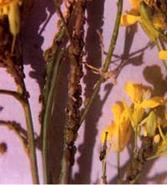Symptoms of damage:
- Both nymphs and adults suck the sap from leaves, buds and pods
- Curling may occur in infested leaves and at advanced stage plants may wither and die
- Plants remain stunted and sooty molds grow on the honey dew excreted by the insects
- The infected filed looks sickly and blighted in appearance
Identification of the pest:
- Aphids: are small, soft-bodied, pearl-shaped insects that have a pair of cornicles (wax-secreting tubes) projecting out from the fifth or sixth abdominal segment.
Management:
- Use tolerant varieties like JM-1 and RK-9501
- Destroy the affected parts along with aphid population in the initial stage
- The crop sown before 20th October escapes the damage
- Set up yellow stick trap to monitor aphid population
- Conserve the following natural enemies: Ladybird beetles viz., Coccinella septempunctata, Menochilus sexmaculata, Hippodamia variegata and Cheilomones vicina thatare most efficient predators of the mustard aphid. Adult beetles may feed on an average of 10-15 adults/day
- A number of entomogenous fungi, Cephalosporium spp., Entomophthora and Verticillium lecanii infect aphids
- Several species of syrphid fly i.e., Sphaerophoria spp., Eristallis spp., Metasyrphis spp., Xanthogramma spp and Syrphus spp. are predating on aphids
- The braconid parasitoid Diaretiella rapae, a very active bio-control agent cause the mummification of aphids
- The lacewing, Chrysoperla carnea predates on the mustard aphid colony
- Predatory bird Motacilla cospica is actively feeding over aphids in February-March
- Spray the crop with one of the following in the flowering stage: oxydemeton methyl, dimethoate @625-1000 ml per ha
|
|

